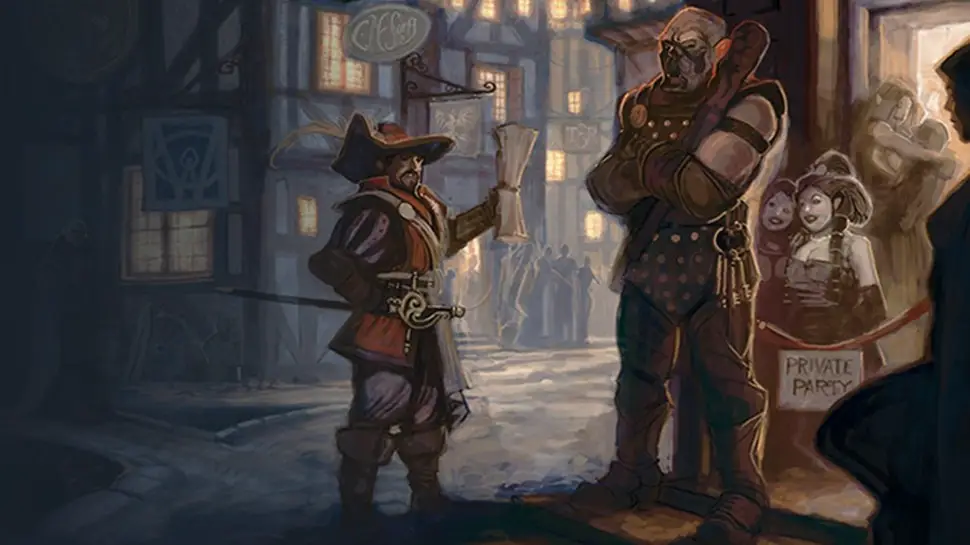When it comes to enchantment magic, the Suggestion spell is one of the most popular options.
For good reason too!
Do you need help convincing the guard to escort you through the heavily guarded gate leading to the king’s quarter? Perhaps you need help convincing the local hoarder of wealth to give some of his wealth away for the greater good?
Or maybe you want to convince the town guard that this is not the Druid they’ve been looking for.
(Feel free to also stop bad puns for the next 8 hours with this fun and useful spell.)
If any of these scenarios interest you may we suggest the Suggestion spell?
Now…
Would you kindly enjoy this guide to the Suggestion spell in D&D 5e?
What is Suggestion?
Suggestion is a useful 2nd level spell from the School of Enchantment.
Casting Suggestion requires an action and the target must be within 30 feet of the caster.
Targets are able to resist the Suggestion if they make a successful Wisdom saving throw. However, if they fail their saving throw they must follow what the caster lays out as the suggested course of action for potentially 8 hours of game time.
Of course, there are nuanced requirements when it comes to what “suggested course of action” the caster can suggest.
First, the suggested activity must be communicated simply in no more than 2 sentences.
Second, the suggested course of action has to sound reasonable and not harmful to the target.
These requirements are spelled out in detail below.
We’re providing the spell description for Suggestion found in the 5E Player’s Handbook for ease of reference as well as clarity.
Suggestion
LEVEL: 2nd
CASTING TIME: 1 Action
RANGE/AREA: 30 feet
COMPONENTS: V, M (a snake’s tongue and either a bit of honeycomb or a drop of sweet oil)
DURATION: 8 Hours
SCHOOL: Enchantment
ATTACK/SAVE: WIS Save
DAMAGE/EFFECT: control
You suggest a course of activity (limited to a sentence or two) and magically influence a creature you can see within range that can hear and understand you. Creatures that can’t be charmed are immune to this effect.
The suggestion must be worded in such a manner as to make the course of action sound reasonable. Asking the creature to stab itself, throw itself onto a spear, immolate itself, or do some other obviously harmful act ends the spell.
The target must make a Wisdom saving throw. On a failed save, it pursues the course of action you described to the best of its ability. The suggested course of action can continue for the entire duration. If the suggested activity can be completed in a shorter time, the spell ends when the subject finishes what it was asked to do.
You can also specify conditions that will trigger a special activity during the duration. For example, you might suggest that a knight give her warhorse to the first beggar she meets. If the condition isn’t met before the spell expires, the activity isn’t performed.
If you or any of your companions damage the target, the spell ends.

WHAT DOES SUGGESTION DO IN 5E?
Suggestion: for when a Persuasion check just won’t cut it.
Suggestion can accomplish quite a bit and is really only limited by the caster’s creativity and imagination.
In general terms, Suggestion is not a combat spell. This is not to say that it can’t be useful in some combat scenarios, but it’s an extremely useful spell outside of combat.
Suggestion allows a caster to suggest a course of action to an NPC who then feels compelled to pursue that action. The suggestion must be worded carefully and be reasonable to the target.
This means that Suggestion can not be used to convince an NPC to harm themselves. This leaves a lot of room for interpretation for the DM and players to work within.
It’s wise to think of some suggestions before using this spell. This should help you get a feel for the proper wording, help you to be reasonably convincing, and get some feedback from the DM.
Just remember the old saying: “you’ll catch more flies with honey than vinegar.” Think of what a reasonable request (likely worded politely if you really want to lay on the charm) would be and how your tone making the request will go over.
Common Uses for Suggestion 5e
There are a gazillion ways to employ this spell which we couldn’t possibly cover in one article. However, we are going to lay out some of the more general and common uses for this handy little spell.
- Convincing “gatekeepers” and guards to let you pass unhindered, even during times of heightened security.
- Getting great deals on equipment, room, and board, or other expenditures you might encounter.
- Convince the local “sheriff in town” to arrest your “no-good” nemesis.
- Suggest that an enemy runs away while they still can instead of throwing their life away.
- To create mistrust between the target and the target’s allies.
- Convince a 3rd party to assist your party in some way. This assistance is up to the caster to decide but could include joining the characters in combat (if that would be considered reasonable for the NPC) or lending them a handful of beasts of burden.
- Convince a servant not to carry out the Mad King’s orders.
- Suggest hirelings and followers into going the extra mile for you.
- Convince the Bandit leader to let your party pass unscathed.
- Convince the prison guard to set you free because surely you are innocent.
As you can see this spell is very useful but requires quick thinking and the ability to clearly communicate “reasonable” requests. Consider what an NPC might consider being reasonable and word your suggestion accordingly.
You probably won’t convince the town’s baker to try to assassinate an evil noble, but you could convince them to run an errand while you watch the shop. Never mind that the noble’s cake might get some dreadful poison added to it in the meantime…
Additionally, keep in mind this spell does not cause the charmed condition but isn’t effective against creatures who are immune to being charmed.
WHO CAN CAST SUGGESTION IN 5E?
In D&D 5e, Suggestion is accessible by many classes, subclasses, and even races. We’re going to start with classes that have Suggestion on their spell lists.
Classes
There are four classes that have Suggestion on their spell lists, Wizards, Sorcerers, Warlocks, and Bards.
It’s certainly a potent spell that’s worth being considered by any caster. However, those who are working as the party’s “face” will likely have more opportunities to use this.
Thankfully, Bards, Warlocks, and Sorcerers are all Charisma-heavy classes which means they likely have some amount of “face” responsibility.
Though that’s not to say that Wizards or less-extroverted characters can’t find plenty of uses for this spell as well!
Subclasses
If we take a look at subclasses, it becomes quite accessible.
At 7th level, the Arcane Trickster Rogue subclass can gain access to the Suggestion spell. (In fact, it’s one of the best spells for Arcane Tricksters to learn!)
Joining the Arcane Trickster is the Eldritch Knight. The Eldritch Knight is a Fighter subclass that can choose to gain access to Suggestion at 8th level.
Let’s not forget Clerics from the Knowledge Domain who also gain access to this spell as early as 3rd level.
Lastly, although the Sorcerer class already has access to Suggestion, the Aberrant Mind subclass can also come into play. We presented this option as it can help Sorcerers who have a limited number of spells they can know to open up their choices a bit more.
Racial Features
There are two races that allow for access to the Suggestion spell.
The first race is the Yuan-ti Pureblood found in Volo’s Guide to Monsters. Once a Yuan-ti hits 3rd level they gain the ability to cast Suggestion once per long rest.
With the release of Mordenkainen Presents: Monsters of the Multiverse Yaun-ti also gain access to Suggestion at 3rd level with their Serpentine Spellcasting racial feature.
The second race that can gain access to the Suggestion spell is the Fierna Tiefling found in Mordenkainen’s Tome of Foes. At 5th level, this variant Tiefling subrace gains the ability to cast the spell once per long rest.

TIPS FOR PLAYERS USING SUGGESTION IN 5E?
Suggestion is a very open-ended spell and it’s impossible to lay out every scenario and related tip in a couple of paragraphs.
Instead, we’re going to hit some general tips that should help you with most scenarios that you encounter. If you find that you still have questions, would you kindly reach out in the comments so that we can help you?
Target the Weak-Minded for Increased Success
This should go without saying, but spells that require a wisdom saving throw are most effective if used on the more weak-minded NPCs one might encounter.
Practice Being Concise
As the spell description says, the suggestion must be worded to sound reasonable and be conveyed in no more than a sentence or two. Some players are going to be better at this than others, but practice definitely helps.
Also, be sure to write down or memorize some suggestions before actually casting the spell. This can be done as the player comes up with some more ideas for what can be suggested and how to make these “suggestions“.
Avoid Targeting an NPC Under the Effect of a Suggestion Spell
An NPC under the effects of a Suggestion spell who is attacked will cause this spell to end.
Keep this in mind, especially if used in a combat situation or where you still need the NPC to continue to follow what was suggested.
If a PC threatens or harms the guard allowing them safe passage, it defeats the whole purpose!
Make Sure the Target Can Both Hear and Understand You
This is an important aspect to remember.
Firstly, the target must be able to audibly hear you. Secondly, they must be able to understand you.
If the target doesn’t understand Common and you make a suggestion using Common, the spell will not work. However, a spell like Tongues can help you get around this pesky issue if there’s a language barrier.
Don’t Target the Undead or Constructs
As stated in the spell description, creatures immune to the effects of being Charmed are immune to Suggestion. This includes most (if not all) undead and constructs.
Whatever you might try convincing that zombie to do, the only thing it’s really concerned with is BRAAAAAINS.
Specifically yours.
Synergy with Bane
Bane causes a target to suffer a -1d4 on their saving throws. This can make for a great “one-two punch” when you really, REALLY need the NPC to see things your way.
Any spell that causes an opponent to have their saving throws penalized would work great with Suggestion.

SUGGESTION 5E DM TIPS
Suggestion is a nuanced spell and some important requirements have to be kept in mind.
We also suggest the DM and the players discuss such nuances before it is officially cast by anyone in the party. This helps clarify what you can and can not do as well as diffuses any in-game tension before it can start.
We’ve already stated above that there is a lot left up to DM discretion when a PC casts this spell.
Try as best as you can as a DM to put yourself in the target’s shoes. The Suggestion spell doesn’t make a target “mindless” nor does it make a target suddenly dumbed down.
Cross-reference an NPCs Wisdom and Intelligence scores as well. A low score in either area will make a target more accepting of what “sounds reasonable”.
When targeting PCs with a Suggestion spell, follow the same advice under the Player’s Tips above. A low-Wisdom character is going to be more susceptible than the party’s more scrutinizing Cleric, Monk, Ranger, or Druid who has likely invested heavily in their Wisdom score.
Also, as mentioned above PCs could use Suggestion to convince a merchant to provide a large “discount” to the caster. Fight fire with fire: try a local merchant who uses Suggestion to manipulate locals and the PCs into paying more.
Have fun with this spell, be creative, and don’t forget your imagination. As a DM be ready to think on your feet!
IS SUGGESTION 5E A GOOD SPELL?
This is a great spell when used properly. The first thing one needs to understand is this is not a combat spell per se. In fact, Suggestion is often used to avoid combat.
Put quite simply, Suggestion is a very powerful utility spell with a plethora of uses.
It’s also a low-cost spell for many (but not all) spell casters. Meaning for Sorcerers and Warlocks who have limited spell slots, it comes at a greater cost than, say, a Wizard who has more spell slots. That being said it is a 2nd level spell so it’s not too great a cost.
Another perk with Suggestion is that it is not a charm-based spell.
This means it can not be “cured” or even detected. Once a creature is under the effects of the spell it will be so for the duration of the spell.
It also means the affected creature will not be hostile or even aware they have been magically manipulated.
Whatever course of action that you have suggested to them seemed reasonable enough that they wouldn’t have reason to suspect you of anything. You’re not mind-controlling them like you would with a spell like Dominate Person.
Though, at the DM’s discretion, a more magically-inclined NPC might be the exception when they see you waving around a snake tongue and honeycomb.
Such a thing could be left to an Arcana check to determine if the NPC realizes what you’re doing in time. In such a case, they might make their save with advantage.
SUGGESTION 5e FAQS
Does Suggestion 5e Cause the Charmed Condition?
No. Suggestion in 5e does not cause the target to be affected by the charmed condition.
Can Elves be Affected by the Suggestion Spell?
Yes. While Elves do get advantage on saves against being Charmed, Suggestion is not a charm-based spell. That means that Elves can still be affected by it and do not make their save with advantage from their Fey Ancestry trait.
Conclusion – Suggestion D&D 5e
The great thing about Suggestion is it leads to plenty of discussion on how many players have used it as well as how to make rulings in the game.
We’d love to hear some of the ways in which you have used Suggestion in your game. Would you kindly share your experiences and ideas regarding this spell in the comments below?
Oh, and while you’re still here…
Would you kindly consider signing up for the Tabletop Joab newsletter below? It’s the best way to get all of the latest guides, tips, reviews, and more for D&D 5e!









